RIP, Dilip Kumar.
A living legend has gone. Yusuf Khan, aka Dilip Kumar, one of the greatest actors (many would say the greatest) of Hindi cinema, a man who could seemingly effortlessly enact any role. A man who could convincingly be the maudlin drunk, the happy-go-lucky joker, the broken-hearted lover, the cynic who looks on with contempt at a world gone awry. Unlike several of his most successful contemporaries, who let their stardom get to their heads until what you saw onscreen was always the star, never the character—Yusuf Sahib managed always, unerringly, to bring the character to life. He was Devdas, he was Noshu. Amar, Azaad, Saleem. And every other character he has played.
While I have compiled a list of my favourite Dilip Kumar songs earlier, I couldn’t not post a tribute to one of my favourite and most-respected actors on his passing. This, therefore: ten songs that show Dilip Kumar in different moods. As always, these are all from pre-1970s films that I’ve watched; additionally, this list does not overlap with my earlier list; which is why you won’t find some iconic Dilip Kumar songs—like Madhuban mein Radhika naache re or Yeh mera deewanapan hai—here. Also, while some of these songs are solos and some are duets, one thing they have in common is that Dilip Kumar’s character always sings.
And, yes, one last condition: no two songs are from the same film.
1. Nature-loving: Suhaana safar aur yeh mausam haseen (Madhumati, 1958). This is one of my favourite nature songs, and I love the way everything about the song comes together to celebrate the beauty and joy of nature. Shailendra’s lyrics evoke the ‘laughter’ of flowers, the frolicking of a river, the mountains all around—and the cinematography, the sheer gorgeousness of the landscape, reflects that reveling in nature. And Dilip Kumar, as the bewitched wayfarer who is both inspired by this natural beauty as well as awed by it, is endearing. The joy in his face when he bends down to a clump of flowers, for instance, or the sudden delight when he teases an echo out of the surrounding mountains: wonderful.
2. Joyful: Aayi hain bahaarein mite zulm-o-sitam (Ram aur Shyam, 1967). A boisterous and wild man who won’t take any nonsense from anyone finds himself mistaken for his long-lost identical twin and catapulted into a household where tyranny rules. He sets about setting things right in the only way he knows how: by showing that he won’t be pushed around, and won’t let other, meeker souls, be pushed around either. And here, at a birthday party for the girl to whom he’s become honorary uncle, he reinforces that message.
Several years back, someone had asked me if there was any actor from the Golden Years of Hindi cinema who was as uninhibited as Shammi Kapoor. Kishore Kumar, I had said; and Shashi Kapoor too. But yes, Dilip Kumar, when the occasion called for it, could be pretty uninhibited too. See the way he lies down on the floor here, or the way he frolics around with thee troop of children doing the twist: no stilted movements, no staid shaking of a mere leg.
3. Restless. Shaam-e-gham ki kasam (Footpath, 1953). This song always evokes for me a combination of emotions. There is the impatience, of course, of the man who is waiting for a lover who has not come. But there is also a simmering restlessness, a tension that surrounds him as he sings of how it is to be alone. There is loneliness here, and a deep yearning for the beloved. While Talat’s voice, Khayyam’s music and Majrooh Sultanpuri’s lyrics create the ambience and tone for the song and its setting, Shaam-e-gham ki kasam may not have been the same without Dilip Kumar, who portrays Noshu so well. That ache, that near-despair, the attempt, even, at resignation. Brilliant.
4. Seductive. Yeh hawa yeh raat yeh chaandni (Sangdil, 1952). As in the case of Shaam-e-gham ki kasam, here too the emotion is not a single one (which goes to show what nuances Dilip Kumar was able to bring into his performances even when he was only lip-syncing to a song). Here, his character is singing a paean to the pretty woman he is with (played by Shammi). He is saying all the right things, and the way he looks at her, touches her, puts his head on her shoulder, acts as if they were all alone in the room: she would be forgiven for thinking he was going all out to seduce her. But there is, too, an underlying cynicism, a certain hardness about the eyes that belies this seduction. He may seduce her, but he doesn’t love her.
5. Maudlin. Ae mere dil kahin aur chal (Daag, 1952). Rarely has it happened that, compiling a post of some favourite songs, watching those songs again for the nth time, I discover something there that never struck me before. That is what happened with this post, and with some of the songs: I thought they mostly exemplified one major emotion, but when I watched them this time, especially closely studying Dilip Kumar’s acting, what struck me was how nuanced it was. Here, though he starts off being the happy drunk, that happiness sinks into a melancholy, a sort of self-pity that swamps him before the happiness reappears briefly—only to be replaced by a vaguely lost look, a man glancing around and not seeing light in the dark anywhere.
What an actor Dilip Kumar was.
6. Patriotic. Yeh desh hai veer jawaanon ka (Naya Daur, 1957). Dilip Kumar’s not unusual onscreen persona of a somewhat conflicted character—basically good, but often fairly flawed as well, as in Amar, Devdas, Aadmi, etc—was not the sort of goodie-goodie uber-patriotic hero of the average Hindi patriotic film. And Naya Daur, while it had a socialist (somewhat Luddist) message, was not a run of the mill patriotic film. This song, though a paean to a motherland that is much loved, has a raw, earthy charm to it that I find very believable for a villager to be singing.
And Dilip Kumar shows that he is capable of all the physicality this song demands. While the bhangra troupe and the other extras do most of the dancing, Dilip Kumar and Ajit do have some fairly energetic leaping about near the end of Yeh desh hai veer jawaanon ka, and Dilip Kumar looks like he’s having a lot of fun.
7. Flirtatious. Tere husn ki kya taareef karoon (Leader, 1964). This film, unlike Naya Daur, was rather more overtly patriotic; Dilip Kumar acted the part of a political leader (and got to lip-sync to the very good Apni aazaadi ko hum hargiz mita sakte nahin). It was an average film, sadly, but what redeemed it somewhat was a clutch of really good songs. Here, in a playful, teasingly flirtatious one, Dilip Kumar and Vyjyanthimala’s characters praise each other to the skies, and insist on tagging on a caveat: this doesn’t mean I’m in love with you. I see you and my heart starts fluttering, but I’m not in love with you. You are too beautiful for me to praise adequately, but I’m not in love with you. And so on and so forth.
The lyrics are teasing, even romantic, and the picturization is playful, what with them play-acting, so to say: she ‘reading’ a ‘letter’ he hands her; he ‘reeling her in’ and so on.
8. Earnest. Tu kahe agar jeevan bhar (Andaaz, 1949). Click the link to this video and (if you don’t want to listen to all of the song) go to the 1:20 mark. See how Dilip Kumar looks fixedly at Nargis as he lip-syncs to this stanza. She blinks, she smiles, she turns away to laugh as Cuckoo’s character comes dancing up to the piano. But Dilip Kumar doesn’t look away. He is mesmerized; he has eyes only for this woman. Even his song, though sung in public, is addressed just to her (even if she does not notice it). This man is earnest. You just have to see his eyes to realize that. Given Dilip Kumar’s character in Andaaz—a man who falls so deeply in love with a woman who regards him as a friend, only to be unable to handle the fact that she is going to marry another—this is a piece of acting that sets up the character really well.
9. Miserable. Mitwa re lagi yeh kaisi anbujh aag (Devdas, 1955). From one of Dilip Kumar’s landmark films—a film with which he’s so inextricably associated that there are many who refer to the actor himself as ‘Devdas’—is this song of the lover who pines for the woman he loves, but who can never be his. There is no shortage of similar songs in Hindi cinema; no lack of men aching for a woman who has been snatched away by fate, by enemies, by even what the character may regard as the woman’s own bewafaai. But few actors manage to portray, without melodrama, what the character is going through. Dilip Kumar does it, and so convincingly that it’s hard to imagine that he isn’t really the dejected, depressed, completely shattered man who’s spending all his days just wandering about, trying to find some relief from the ache… look at that emptiness in his eyes, the sheer misery.
10. Empathetic. Chhod baabul ka ghar (Baabul, 1950). And, to end, a fitting song for a much-loved actor who is now gone. A song of farewell. I had wanted to post O door ke musaafir, from Udan Khatola, but I’d already included that in my earlier list of Dilip Kumar posts. But this one, another song in which Dilip Kumar’s character bids farewell to the woman who has loved him, is also very dramatic. The interesting bit here is that Dilip Kumar plays a man loved by two women: a poor village girl (played by Nargis) and a wealthy city girl (Munawar Sultana); he falls for the latter, without realizing that the village girl has misunderstood his kindness for love. Much drama ensues, but at the end, when the village girl is dying, he sings to her a song she had sung earlier. A song of farewell, but a song also of empathy and comfort. This man feels no romantic love for this woman, but he shares in her anguish, he is able to feel for her as she leaves…
Goodbye, Mr Khan. Thank you for the cinema. You will live on, your films will endure.


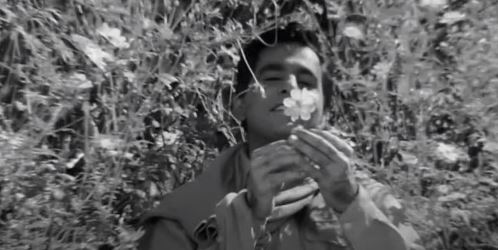
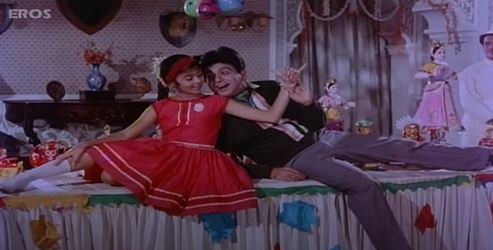
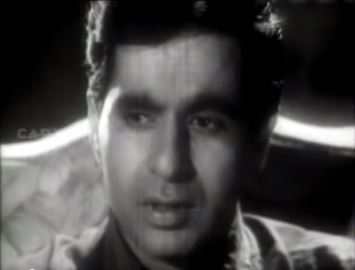
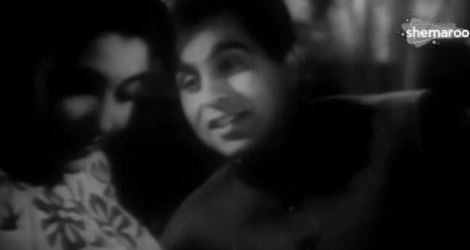
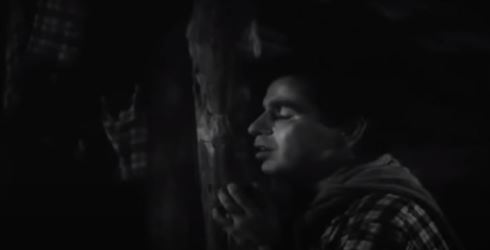

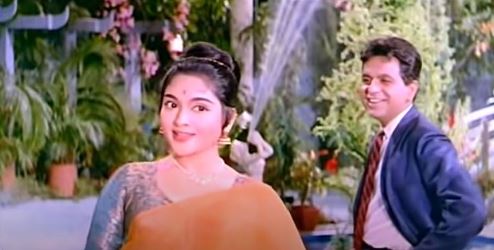
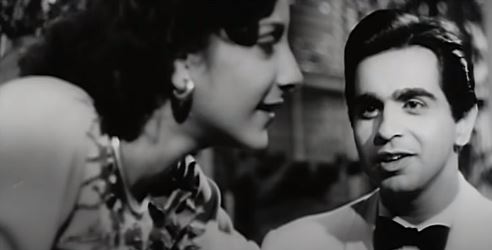


Wow……fantastic tribute & loved the way you described the nuances!
LikeLike
Thank you so much, I’m glad you enjoyed this post.
LikeLike
His talent for light comedy is often overlooked, notwithstanding corkers like Kohinoor and Azad. Also his capacity to play the country bumpkin (recall his impeccable Bhojpuri in Azad, and also the gawd-help-us in Ram Aur Shyam?).
Two favourites. In the first one he combines comedy and bumpkin: Saala Main Toh Sahab Ban Gaya (Sagina, 1974):
In the second he personifies the cultured aesthete: Madhuban Mein Radhika (Kohinoor, 1960)
(Incidentally, Madhu, I’m surprised you left out this one.)
LikeLike
Sorry, posted the wrong link for Madhuban Mein Radhika. The correct link, now:
LikeLike
I love both these songs, and yes – I totally echo that bit about him being a great comic actor. I think basically a very versatile actor, so give him any role, any type of role, and he’d do it justice. Remember that scene in Kohinoor – or was it Azaad? – where he talks to himself in the mirror? Most people would only remember Amitabh Bachchan’s riff on that, but Dilip Kumar was superb.
BTW, you should read the introductory paragraphs of this post. Then you’ll know why I didn’t include Madhuban mein Radhika naache re. :-)
LikeLike
Whoopsy! Had missed out that mention of Madhuban Mein Radhika. Which list did you include it in?
LikeLike
Right, got it.
LikeLike
:-)
LikeLike
Unlimited thanks to you for this post befitting the sad occasion as it contains many of my favourite songs. I am pleasantly surprised to find Aayi Hain Baharein Mite Zulm-o-Sitam herein. I have kept this song at the numero uno position in my own list of joyous songs from Hindi movies. The song which I deeply missed in this list is Jab Jab Phool Khile Tujhe Yaad Kiya Hamne from Shikast (1953).
LikeLike
Thank you for the appreciation, I’m so glad you liked this post. And thank you for reminding me of that lovely song from Shikast. Here it is:
LikeLiked by 1 person
I saw this movie as a child on Doordarshan and it left its inedible mark. Little did I know then that the story was by Ritwik Ghatak and it was the directorial debut of Hrishikesh Mukherjee. Remembered this song always, LAAGI NAAHI CHHOOTEY RAMA CHAAHE JIYA JAAYE. Later I discovered it was sung by Dilip Saab himself !
LikeLike
Oh, yes. Musaafir is a film I’ve been meaning to watch for a while now. And Dilip Kumar’s rendition of Laagi nahin chhoote is so stirring, so good!
LikeLike
Love the list and your analysis of his performances, Madhu. What a great ‘song’ actor he was! Very few actors can lip sync, look like they are singing and emote at the same time.
Does it surprise you that your ‘moods’ list and mine have four songs in common? :)
https://anuradhawarrier.blogspot.com/2017/12/the-many-moods-of-dilip-kumar.html
And to further validate your contention that each of these songs had different emotions/moods, you will notice that the four songs have been listed under very different moods in my list. :)
LikeLike
Thank you, Anu!
And, I had completely forgotten that you’d done a ten moods post for Dilip Kumar too. Just as well – I might have chickened out of doing my own take on that, if I’d remembered.
Interestingly, looking at the songs on your list (and yes, we do see varied emotions there), I notice that there are several songs – Toote hue khwaabon ne, Yeh mera deewanapan hai, and Madhuban mein Radhika among them – which would have featured on this list too, if I hadn’t already included them in my earlier DK songs list. So our lists might have mirrored each other even more! ;-)
LikeLike
Thanks for the wonderful post! He was undeniably one of the greatest actors of Indian cinema. It was a pleasure to watch him on screen.
I was happy to see my favorite song “Tere husn ki kya tarif…” on your list. Thanks.
LikeLike
Thank you for the appreciation. I’m glad you enjoyed this post.
LikeLike
We will not be able avoid cliches while talking about Dilip Kumar . Suffice to say he was the biggest legend of them all-a legend among legends. Though his passing is saddening , the fact that he was never seen or was in public life for almost a decade attenuates the sorrow of his passing to a certain extent. All hero worshippers want their heroes to live for ever and outlive them & it is no different in case of Yusuf Sab’s fans/admirers. So long as man wants entertainment in the form of moving pictures on the screen Dilip Kumar will live no matter what changes grotesque commercialization wrings from the medium. Au revoir immortal Dilip Kumar; to say we will miss you is a gross understatement
LikeLike
That’s so well put, and such a touching tribute to really the greatest legend of them all.
True, to say he will be missed is a gross understatement.
LikeLike
A fitting tribute one must say.
As a second choice from Ram aur Shyam one would have liked ‘aaj ki raat meri dil ki salami’.
And the Munnawar-Dilip duet ‘miltey hee….deewana’.
But how does one choose from such a vast and compelling collection.
Wonderful artiste. Wonderful memories. Wonderful days. Artistes one could look up to and not gossip about.
Possessing the single quality which bollywood now lacks. Dignity.
LikeLike
I didn’t include Aaj ki raat mere dil ki salaami le le because it was part of my earlier song list on Dilip Kumar. And, as I’ve mentioned in the introduction to this post, I didn’t repeat any songs from that list.
I did have Milte hi aankhen dil hua on my shortlist here, but chose Chhod baabul ka ghar because I preferred Dilip Kumar’s emotions in that – more nuanced, more subtle, I thought.
Thank you for that comment, I echo what you say. The dignity of that era is sadly lacking these days.
LikeLike
A great song list Madhuji!
Loved your commentary more than anything else in the post. Such a well written and insightful. That too in a very short time.
Thank you for the wonderful list.
I would add,
Do sitaron ka zameen par
And
Nain lad jayi hai to
I was pleasantly surprised to watch him singing joyously and even dancing in the latter, when I watched it for the first time.
Nain mile nain hue banware
Ab yaad na kar bhool ja
And
One of my great favourites
Yahan badla wafa ka
DK with Noorjahan for a single film also Rafi with Noorjahan for the only song, they sang together
LikeLike
Thank you, Anupji – for the appreciation, as well as for the great songs you posted! Nain lad jayee hain I wanted to post too, but since I’d already included that in my earlier list, I had to exclude it here. And Do sitaaron ka zameen par hai milan was on my shortlist for this post – I really like that song a lot. :-)
LikeLike
Is it true that the small girl in the song ‘Aayee hai bahare’ who is held by Dilip Kumar in the beginning of the song is (Bhanu)Rekha?
LikeLike
I have no idea! I wonder – I hope someone else can shed light on this.
LikeLike
The girl in the film, who plays Dilip Kumar’s niece, is Baby Farida. Rekha didn’t act in Hindi films until her debut in Sawan Bhadon (though Anjana Safar was the first Hindi film she signed). She didn’t do very many films as a child artiste either – only a couple in Telugu.
LikeLike
I feel like such a fool. I assumed that everybody knew who Baby Farida was, so the ‘little girl’ being asked about was – I thought – the one at the 1:00 mark, whom Dilip Kumar very briefly picks up off the table and twirls about.
LikeLike
Now I feel like such a fool! The original commenter probably meant the girl you mention – but that isn’t Rekha either. (The rest of my comment – thankfully – holds!)
LikeLike
Yes, I was quite sure that wasn’t Rekha either, because in any case, since this film was 1967, and Rekha debuted in Hindi cinema just a few years later, she couldn’t have been this small.
But Anu, that tiny girl appears only too briefly in the song. So maybe the indication by the OP was for Baby Farida. :-)
LikeLike
Actually that is the girl I was asking about
Nitin
LikeLike
This is a lovely way of paying tribute to/showcasing a virtuoso performer, Madhu. I was delighted to see some of my favorites, such as yeh hawa ye raat, mitwa, and teri husn ki kya tareef karun, included in your list. Your comment about there being layers of meaning and emotion in his performances is well observed and one of the things that made him so interesting to watch.
LikeLike
Thank you so much, Shalini! I’m so glad you enjoyed this post. :-)
LikeLike
Thank you, thank you for this. His death, in a way, heralds the end of a generation of people who were good actors/ singers/ directors, and who tried to be good people too. Have been reading about his work for fighting alongside and for the rights of the Pasmandas in Maharashtra. PETA spoke about his contribution. To be good at your art and then use the status earned out of it to try to make things right is not something most do. Especially today’s film industry who are so scared to take any stand, pandering to whoever is in power. They really don’t make them like this anymore :-/.
Have been watching his movies for the past few days- Amar (truly unusual for an actor of his stature to take a role like that!), Madhumati (how sexy is he when he, not the female lead, gets wet in the rain!), Naya Daur (immaculate dhoti even when he digs the road for the race), Andaz (again, a character who is not completely dhoodh dhula). Sigh. I wish there were better words to describe the dwindling state of affairs. Is his death the final nail in the coffin? I feel the song, Ae mere dil kahin aur chal, intensely and so very deeply.
LikeLike
“Especially today’s film industry who are so scared to take any stand, pandering to whoever is in power.”
Sadly, so true! And so all-pervasive. There are very few who have the guts to stand up for the truth in these days. Especially, ironically enough, the ones who are influencers and could therefore be expected to make a difference. :-(
I really love the movies you mention; I wish I had the time to revisit all of them! But I have so much to do these days, I can only afford to make time to watch something ‘new’. Am watching Sangharsh these days.
LikeLike
Gosh, I really should watch Ram aur Shayam next, to remind myself of his amazing and impeccable comic timing, as well!
LikeLike
That is one I’ve never reviewed on this blog! And I watched it so long ago, I don’t remember the minor details of it. I think a rewatch is in order…
LikeLike
Sorry for so many comments! But was just re-reading the post and remembered the scene form Ram aur Shayam where Dilip Kumar, very effortlessly, slides down the handrail and imitates the secretary (I think?) and I had fallen off the chair, laughing at it.
Ok, it is done. Have to watch Ram aur Shayam!
LikeLike
Even Sagina & Bairaag had Dilip Saab performing comic scenes with effortless ease
LikeLike
Done. Next on list! Thanks for the recommendations! :-)
LikeLike
Oh, nice. I have Sagina Mahato on my watchlist too.
LikeLike
Sagina Mahto is incidentally one of those movies that were attempts at something different , but not quite getting it. Nonetheless a very very interesting movie.
LikeLike
I am intrigued now! Looking forward to watching it. :-)
LikeLike
Madhuji, there is another category that I would want to add from one of my favourite movies – the vengeful lover.
The song is from Dil Diya Dard Liya
Guzre Hain Aaj Ishq Mein Hum
The words that that I love are
Waaqif hain Hum Bhi Khoob
Har Ek Inteqaam Se
In fact when I went to Mandu, I was desperate to find the statue that was used in the film. And I finally did. One of my early blog posts ” In Search of Sculpted Serenity” was dedicated to the statue. https://anitamultitasker.wordpress.com/2020/05/31/in-search-of-sculpted-serenity/
LikeLike
What an interesting anecdote, Anitaji! Thanks for sharing that. And yes, Dil Diya Dard Liya did have wonderful songs. Thank you for this one.
LikeLike
For a larger-than-life figure like Dilip Kumar sahib, it isn’t easy to capture his professionalism and qualities in just a few words. Kudos that you managed it while x-raying his traits in various shades. You have a powerful pen that allowed you to do so. Commendable, indeed. ❤️
LikeLike
Thank you so much! You’re very kind.
LikeLike